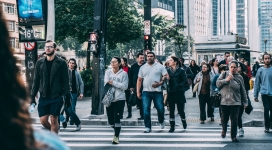
In a recent webinar titled “The Impact and Application of AI on Pastoral Care” hosted by CSA, guests of honor Pastor Gideon Lee and Dr. Chan Kai-pak explored the far-reaching impact of Artificial Intelligence (AI) on churches and the Christian culture from the macro and micro perspectives, respectively.
Pastor Gideon and Dr. Chan met while they were at MIT, and together they formed the Hong Kong Student Bible Study Group. The two have deeply studied the intersection of technology and theology. Pastor Gideon is now a pastor at the Cross Point Church of Silicon Valley, serving also as an adjunct faculty member at a seminary. Dr. Chan is a veteran software engineer and theology professor. At the AI seminar, Dr. Chan focused on the impact of AI and its far-reaching influence on society, while Pastor Gideon focused on the application of AI.
Dr. Chan: AI’s Influence & Impact on Society, Church, and Personal Life
AI technology has surpassed human intelligence and achieved amazing feats in various professional fields already, Dr. Chan points out. He emphasized that the advancement of AI not only affects the technical level, but causes profound changes on the human, cultural, and philosophical levels.
For example, the use of AI in the medical field raises ethical questions relating to biased data and invasion of privacy. Dr. Chan believes that while technology can magnify problems to be visible, only Jesus Christ can truly solve the fundamental issue.
Then in the church, AI poses challenges to traditional pastors and their preaching with abilities such as being able to mimic David’s psalms to write Lamentations. Dr. Chan also points out that the entertainment industry may replace the work of many people with AI applications, and the first to go will be the extras and voice actors.
Quoting Technopoli, Dr. Chan illustrated how technology went from a tool to solve problems to becoming the problem itself, ultimately controlling human life. He called on the church to think about revamping the education system, especially as institutions such as MIT have already begun putting more emphasis on creativity, teamwork, leadership, and other qualities aside from grades.
To address the challenges AI brings, Dr. Chan suggested that churches reposition the role of the pastor from the evangelist to the community builder, as well as adapt to the trend of virtualization in the post-pandemic era. He encouraged church leaders to think about how to adjust their roles to better meet the challenges of AI.
Pastor Gideon: AI Can Accelerate the Spread of the Gospel
Pastor Gideon shared his insights from a technical perspective. He shared the importance of language tools, especially digital ones (such as OCR, voice recognition, handwriting recognition, etc.), in the church and theological education. Pastor Gideon pointed out that, although there is still resistance in the Chinese Christian publishing community towards new technology, mature tech such as OCR still plays an important part in digital Chinese Christian resource creation.
In terms of practical application, Pastor Gideon introduced how AI accelerates the process of translation and captioning. Functions such as YouTube’s auto caption and translation, Adobe Premiere Pro’s auto caption, and Zoom’s recording, transcribing, and translating are all fair tools to use. Pastor Gideon himself has dabbled with Google translate and DeepL, and comparatively believes that DeepL performs better when dealing with theological terminology. He suggested using the Glossary function of DeepL to improve the quality of translations.
Looking to the future, Pastor Gideon talked about how grammar and spell checking tools are crucial to improving the quality of translations. He predicted that voice copying technology and virtual tutors would become a part of theological education. He emphasized, that although AI could lead to the dismissal of traditional posts, it will at the same time accelerate the spread of the gospel, allowing the Word of God to reach an even wider audience. He encouraged everyone to think about the benefits and potential AI applications can bring, and to explore these technologies to more efficiently advance the work of the gospel.







